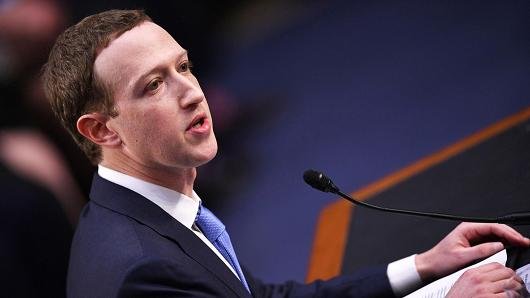
- Facebook CEO Mark Zuckerberg appeared in front of the Senate Judiciary and Commerce committees Tuesday.
- Questions included the social network's role in the 2016 presidential elections and how it handles data.
- Zuckerberg answered questions on how Facebook will handle future elections, whether it was a monopoly, and how it should be regulated.
Facebook CEO Mark Zuckerberg returns to Capitol Hill on Wednesday a day after answering questions from the Senate Judiciary and Commerce committees.
In an hours-long grilling Tuesday, the questions ranged from the social network's role in the 2016 presidential elections to how the company handles data.
Here are the key moments.
Facebook did not notify FTC about data leak
Zuckerberg said Facebook did not notify the Federal Trade Commission about the Cambridge Analytica data leak from 2015 because the company "considered it a closed case."
The profiles of 87 million Facebook users were harvested by a quiz app with the data being soldto political consultancy Cambridge Analytica, which supported Donald Trump in the election. Facebook demanded the maker of the quiz app as well as Cambridge Analytica delete the data. The social network was assured that this was done in 2015, but recent reports suggest that the data still exists. Cambridge Analytica denies this.
Mark Zuckerberg says Facebook didn't notify FTC of leak: 'We considered it a closed case'
Facebook admitted it hadn't checked the data was erased after it made the request to Cambridge Analytica to do so.
"We considered it a closed case. In retrospect that was clearly a mistake. We shouldn't have taken their word for it," Zuckerberg told the senators.
Contact with Mueller
Facebook is "working" with special counsel Robert Mueller's investigation into Russian interference in the 2016 presidential election, according to Zuckerberg. He said he had not been personally interviewed by Mueller's team, but that others in the company had.
How will Facebook handle future election meddling?
Confidently. That's the message from Zuckerberg who said he feels the social network is well equipped to handle upcoming votes such as the 2018 U.S. midterms and elections in countries like India and Brazil.
"This is an arms race. They're (potential groups that want to intervene) going to keep on getting better at this. And we need to invest in keeping on getting better at this too," Zuckerberg said.
"I have more confidence that we're going to get this right," he added.
A paid version of Facebook?
Facebook Chief Operating Officer Sheryl Sandberg told NBC News last week that users could have to pay to completely opt out of their data being used to target them with advertising.
Zuckerberg clarified this, saying that "there will always be a version of Facebook that is free." The CEO explained that an ad-supported model is "most aligned with our mission of trying to connect everyone in the world, because we want to offer a free service that everyone can afford."
'Your user agreement sucks'
Facebook has come under fire for not having a clear explanation of how data it collects are being used. Republican Sen. John Kennedy of Louisiana highlighted this point with a frank comment.
"Here's what everyone's been trying to tell you today — and I say it gently — your user agreement sucks," Kennedy said. "The purpose of a user agreement is to cover Facebook's rear end, not inform users of their rights."
Zuckerberg said he imagines that "most people do not read the whole thing," but they have the "opportunity" to.
Facebook: Tech firm or publisher?
The debate on whether Facebook is a publisher or merely a technology platform continues and was brought up in the testimony. Sen. Dan Sullivan, R-Alaska, asked Zuckerberg how he classed Facebook.
"When people ask us if we're a media company or a publisher, my understanding is — what the heart of what they're really getting at is — do we feel responsibility for the content on our platform?" Zuckerberg said.
Source: https://www.cnbc.com/2018/04/11/facebook-ceo-mark-zuckerberg-testimony-key-points.html